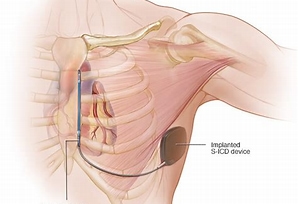
Pacemaker Replacement Surgery, is it Time?
Can Your Pacemaker Be Removed?
What are the conequences?
Is it time for your pacemaker replacement surgery? Everyone that has one will end up getting a replacement at some time. The batteries should last for about 13 to 15 years. Technology has come a long way, as it use to be 6 to 10 years.
For Some that have had a pacemaker implanted and changed their mind for whatever reasons, Yes you can have it removed. It’s not recommended because if you do this, you will go back to the same condition you started with before the procedure, or worse.
Not only is it discouraged (unless you have a good reason to), but it’s a painstaking procedure to remove the leads per Froedtert Medical College of Wisconsin. Scar tissue naturally grows where the lead attaches to the heart, and the longer the lead has been in, the more likely it is connected to the tissue, making it difficult to separate from the heart.
Pacemaker Removal Surgery
What Happends When You Get A Pacemaker Replacement Surgery?
Lead removal is often performed as a minimally invasive procedure. In the pacemaker removal surgery, they’ll make a small incision over the subclavian vein, but, if that’s not possible, they approach through a puncture in the femoral vein.
The lead extraction team places a sheath around the lead and advances it to the tip of the lead. Dr. Adsit explains that “We gently have to free the lead from that tissue”.
*Then the team uses a tiny laser or drill like instrument at the tip of the catheter surrounding the lead, trying to carefully separate the lead from the heart wall to avoid any tears. Hospitalization is usually required for one or two days.
Pacemaker Replacement Surgery
During the pacemaker Removal Surgery,
During the pacemaker removal surgery and the patient needs new leads or an updated device implanted, this is the time to do it. Some reasons for needing new leads and or new devices’ can be:
- The lead malfunctions or the manufacturer recalls it.
- Blood clots or scar tissue interferes with blood flow through the vein.
- The inside or outside of the lead breaks.
- Arrhythmia is triggered by a lead.
- Too much scar tissue growing around the tip of the lead (exit block), affecting the devices’ performance.
What is The Pacemaker Replacement Surgery Recovery Time?
How to Take Care of Yourself When You Get Home
Pacemaker or ICD replacement is surgery to put a new heart device in your chest. The battery in your new device is fully charged. Your doctor may have also replaced the leads from the device to your heart.
Your chest may be sore, some people don’t feel much pain, others do. You might have a little swelling and soreness but these symptoms will go away after about 1 or 2 weeks.
5) You’ve just had Pacemaker replacement surgery
- Be sure to get rest when you feel tired. You should try to be active, walking is a good choice.
- Don’t raise your arm (the one on the side of your body where the device is located) above your shoulder until your doctor says it’s ok, typically a week.
- Allow your body to heal and don’t move quickly or lift anything heavy until you are feeling better.
- Avoid activities that strain your chest and upper arm muscles until the doctor says it’s ok, maybe a week or two.
5) Incisions care
- If you have strips of tape on the incision the doctor made, leave the tape on for a week or until it falls off on it’s own.
- You can take a shower 24-48 hours after surgery, just pat dry and no bath for the first 2 weeks.
- The incision will be covered by the dressing which helps it to heal while being protected.
5) Instructions to Follow
- Keep a medical ID card with you at all times, it will say you have a heart device. You’ll get an updated card with information about your new device as well as a booklet. The booklet answers the following questions;
- How Many inches must I be from a microwave?
- Can I go through security check at the airport?
- Can I walk through Walmart security entrance?
- What if I need an MRI? Ask the technician this question.
You’re Going to Have lot of questions running through your mind.
Write Your Questions Down
My suggestion is to carry a pad and pen so you can write them down as you think of them. Then, the next time you talk to your doctor, you can get answers to your questions.
It will take time to start feeling normal again. The doctors have to adjust your pacemaker to your heart rhythm and eventually you will find that perfect rhythm. Your visits will less and less and medications will help to get you back in control.
What is an ICD?
An Implantable Cardioverter-defibrillator
An ICD is a small battery-powered device placed in the chest. It will detect and stop irregular heartbeats, (Arrhythmias). AN ICD continuously monitors the heartbeat and delivers electric shocks, when needed to restore a regular heart rhythm.
Both devices’, ICD and AICD are devices’ implantable in the body to perform cardioversion and pacing of the heart. The ICD is the first line of treatment and prophylactic therapy for patients at risk for sudden cardiac death due to ventricular fibrillation and ventricular tachycardia.

What is an AICD?
An Automated Cardioverter Defibrillator
An AICD is a device implantable inside the body, able to perform defibrillation. Depending on the type, cardioversion and pacing of the heart. It’s like, if you go out of rhythm, your own personal defibrillator will give your heart a little jump start.
AICD was trademarked by the Boston Scientific corporation, so the more generic ICD is the preferred terminology.
Current Device Batteries
Current Device batteries will last about 6 to 10 Years.
With advances in technology (batteries with more capacity or potentially rechargeable batteries) it may be possible to increase this well past 10 years. It’s 2023, Boston Scientific batteries are lasting as long as 13 to 15 years.
If your heart beats a normal beat, your pacemaker will last longer, opposed to a very irregular and demanding heart beat that will expire the batteries sooner.
When You Should Call For Help
Call Your Doctor Right Away or 911 if You Experience Any Of The Following:
- You are dizzy, lightheaded or faint.
- Get a shock from your ICD
- Hear an alarm or feel a vibration from your heart device, that means to call your doctor.
- Have signs of infection.
- You have pain that does not get better after you’ve taken your pain medicine.
- Loose stitches or your incision comes open.
- Bright red blood has soaked through the badages where your incision is.
- Increased pain, swelling, warmth or redness.
- Red streaks leading from the incision
- Fever
- Lost consciousness
- Have trouble breathing
How Many People in the USA, Have ICDs?
Each month, about 10,000 Americans have implantable cardioverter-defibrillators (ICDs) put into their bodies. The main function of these devices is to sense fast or irregular heart rhythms that can be potentially fatal and then to shock the ventricles (the hearts two main pumping chambers), back into a regular healthy heartbeat.
Conclusion
Who is at risk for Heart disease?
As of 2018, 30.3 Million U.S. adults were diagnosed with heart disease. Every year, about 347,000 Americans die from heart disease, making it the leading cause of death in the U.S. killing 1 out of 4.
According to the Centers For Disease Control and Prevention, approximately every 40 seconds an American will have a heart attack. Every year, 805,000 Americans have a heart attack, out of that number, 605,000 of them for the first time.
We all need to do something life changing to turn heart disease around. I belong to a heart disease group that I really enjoy being a part of. Some people have passed on and others live everyday with fear of them passing. The stress and anxiety, not to mention the depression is real.
To listen to their stories has been a huge eye opener for me. I have a pacemaker and live with Atrial Fibrillation if you haven’t read my about Sherry page. I give my time and share my experiences with the other members and reciprocate.
I find research that points them in the right direction to help them in any way I can. Please take of yourselves and Bless You All.
Leave me a comment below and feel free to visit my other site at https://my-heart-health.com
Wishing You Well, Sherry



